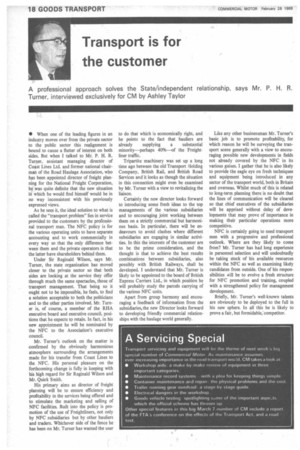Transport is for the customer
Page 20

If you've noticed an error in this article please click here to report it so we can fix it.
A professional approach solves the State/independent relationship, says Mr. P. H. R. Turner, interviewed exclusively for CM by Ashley Taylor
• When one of the leading figures in an industry moves over from the private sector to the public sector this realignment is bound to cause a flutter of interest on both sides. But when I talked to Mr. P. H. R. Turner, assistant managing director of Coast Lines Ltd. and former national chairman of the Road Haulage Association, who has been appointed director of freight planning for the National Freight Corporation, he was quite definite that the new situation in which he would find himself would be in no way inconsistent with his previously expressed views.
As he sees it, the ideal solution to what is called the "transport problem" lies in service provided to the customers by the professional transport man. The NFC policy is for the various operating units to have separate accounting and to work commercially in every way so that the only difference between them and the private operators is that the latter have shareholders behind them.
Under Sir Reginald Wilson, says Mr. Turner, the state organization has moved closer to the private sector so that both sides are looking at the service they offer through much the same spectacles, those of transport management. That being so it ought not to be impossible, he feels, to find a solution acceptable to both the politicians and to the other parties involved. Mr. Turner is, of course, a member of the RHA executive board and executive council, positions that he expects to retain. In fact, in his new appointment he will be nominated by the NFC to the Association's executive council.
Mr. Turner's outlook on the matter is confirmed by the obviously harmonious atmosphere surrounding the arrangements made for his transfer from Coast Lines to the NFC. His personal pleasure on the forthcoming change is fully in keeping with his high regard for Sir Reginald Wilson and Mr. Quick Smith.
His primary aims as director of freight planning will be to ensure efficiency and profitability in the services being offered and to stimulate the marketing and selling of NFC facilities. Built into the policy is promotion of the use of Freightliners, not only by NFC subsidiaries but by other hauliers and traders. Whichever side of the fence he has been on Mr. Turner has wanted the user to do that which is economically right, and he points to the fact that hauliers are already supplying a substantial minority—perhaps 4096—of the Freightliner traffic.
Tripartite machinery was set up a long time ago between the old Transport Holding Company, British Rail, and British Road Services and it looks as though the situation in this connection might even be examined by Mr. Turner with a view to revitalizing the liaison.
Certainly the new director looks forward to introducing some fresh ideas to the top managements of the various subsidiaries and to encouraging joint working between them on a strictly commercial but harmonious basis. In particular, there will be endeavours to avoid clashes where different subsidiaries are engaging in similar activities. In this the interests of the customer are to be the prime consideration, and the thought is that to achieve the best results combinations between subsidiaries, also possibly with British Railways, shall be developed. I understand that Mr. Turner is likely to be appointed to the board of British Express Carriers Ltd., in which position he will probably study the parcels carrying of the various NFC units.
Apart from group harmony and encouraging a feedback of information from the subsidiaries, the new Director looks forward to developing friendly commercial relationships with the haulage world generally.
Like any other businessman Mr. Turner's basic job is to promote profitability, for which reason he will be surveying the transport scene generally with a view to encouraging possible new developments in fields not already covered by the NFC in its various guises. I gather that he is also likely to provide the eagle eye on fresh techniques and equipment being introduced in any sector of the transport world, both in Britain and overseas. Whilst much of this is related to long-term planning there is no doubt that the lines of communication will be cleared so that chief executives of the subsidiaries will be apprised without delay of developments that may prove of importance in making their particular operations more competitive.
NFC is certainly going to need transport men with a progressive and professional outlook. Where are they likely to come from? Mr. Turner has had long experience in personnel selection and will undoubtedly be taking stock of his available resources within the NFC as well as examining likely candidates from outside. One of his responsibilities will be to evolve a fresh structure for NFC promotion and training, coupled with a strengthened policy for management development.
Briefly, Mr. Turner's well-known talents are obviously to be deployed to the full in his new sphere. In all this he is likely to prove a fair, but formidable, competitor.








































































































